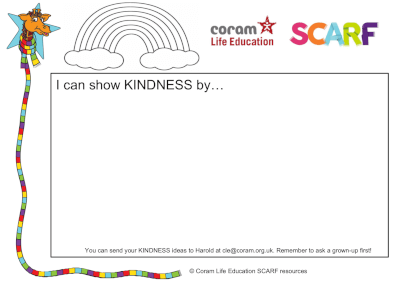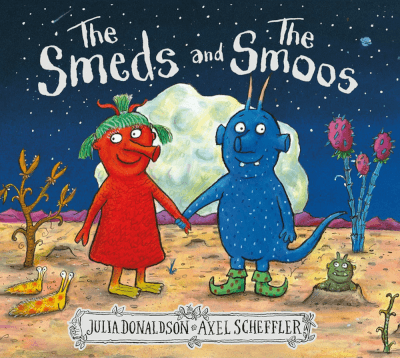RSE Day 2023: Let's Launch into Kindness
RSE Day is a day to celebrate great Relationships and Sex Education in schools and other settings. RSE Day takes place on the last Thursday in June each year and is on Thursday 29th June this year.
The theme this year is Let's Launch into Kindness. On this page, you'll find ideas and activities to help everyone in your school spread some kindness - in school and beyond!
We've found some special stories that link kindness with colour, to help rocket-boost your RSE day this year and help your school launch into kindness!
Your Launch into Kindness Assembly plan
NB: the ideas and activities don't need much preparation, but there are a few items you'll need if doing all the activities - in particular for the Secret Mission Acts of Kindness.
Begin RSE day assembly with Colour your World with Kindness!* This inspiring film, from the Better Worldians Foundation, is perfect for an assembly about kindness. Only two minutes long, the film tells a story, in music and pictures, about how kindness can spread, from person to person, right around the world.
*NB - the film is on Youtube. before using it in your assembly please ensure that it plays. Also, cue up the film and pause it at the start to avoid additional adverts that appear before it. Be ready to stop it immediately after it ends, to stop further films from being played.
Suggestions for following up on the film in your assembly:
1. Kindness is contagious!
Explain the concept of spreading kindness: talk about how an act of kindness can very often cause other people who receive kindness or who see kindness to feel and act more kindly themselves.
2. Opposites
Do a pairing activity where children have to find the opposites that relate to kind or unkind behaviours. Choose some words about unkind behaviours and get the children to guess their 'kind' counterparts - here are some ideas:
- Unhelpful...Helpful
- Selfish...Sharing
- Dishonest...Honest
- Miserable...Joyful
- Annoyed...Patient
For each pair of words, ask the children how they would feel if people behaved in the ways described by the 'unkind' word of each pairing.
Then talk about how they would feel if people behaved in the ways described by the 'kind' words in the pairings.
Finally, ask the children which of the words in each pair would help to 'colour' their school - as we saw in the film.
3. Spot and celebrate kindness!
You could complete the assembly by showing the children the Celebrating Kindness Certificate on your IWB, or print it and show it in the assembly.
Explain that each teacher will have kindness certificates and children can nominate classmates who they've spotted being kind to someone.
Have a Kindness celebration assembly the next day (or next week), to give out the certificates to those children nominated.
4. Secret mission acts of kindness - all day long
Finally, introduce the challenge for the rest of the day. Before the assembly create an Acts of Kindness secret mission display somewhere in school - it can be as simple as a board with your chosen secret acts of kindness written on them, somewhere visible to all children. At the end of your assembly, reveal where it is. Explain to the children their secret mission: to choose one act from the list and carry it out without being detected.
The 'secret mission' activity encourages selflessness as well as kindness.
Let's Launch into Kindness Day - activities
The Smeds and the Smoos
The Smeds and the Smoos is a moving story by Julia Donaldson about how kindness, compassion and the fear of losing something precious can help two clashing communities overcome their prejudices and break down the unhelpful barriers that these create.
Here are lots of ideas, including some based on this story, to help you celebrate kindness.
English - writing and spoken language activities
Launch a kindness letter!
Use this rocket postcard template for children to write a letter or postcard.
Recipe for kindness
Use this recipe for kindness template for children to write the ingredients - and method - for a brand new kindness recipe.
Let's talk about kindness
Talk about kindness with younger children using this game. Take some pictures from the book after reading it to the class. For each picture, ask the class how the Smed or Smoo is feeling. Label the pictures. Use the activity to generate a discussion about how actions make others feel and the importance of kindness.
If the children have made a kindness rocket picture, ask them what they would put in the rocket if they were sending it to someone.
For older children, use this drama activity to get children thinking about kindness.
Hot Seating of the grandparents. The grandparents could be played by the teacher or class members. Put the chosen grandparent in the hot seat. The class can ask questions and give advice based on kindness. Remember to set some ground rules to create a safe environment before starting the role-play. For example: the person in the hot seat (especially if one of the children) needs to remember use respectful language at all times. The children asking questions also need to express their ideas respectfully.
Poetry, please
Children compose an acrostic poem using the word KINDNESS
Compliment corner
Create a corner of the classroom with some post-it notes, coloured pens or pencils and a display board. Children can write kindly-worded compliments or kindness ideas on the post-its and stick them on the display board. Alternatively, have a kindness tree where children write on paper leaves and stick them to a 'tree' made from card or paper, displayed in the classroom.
Circles of kindness
After reading the Smoos and the Smeds - or watching the film of it - have 'SCARF time' (for SCARF schools) or Circle time. Here are some ideas for starter sentences:
- 'The thing I noticed that the Smeds and the Smoos had in common was...
- To me, kindness means...
- I can be kind to others by...
- I can be kind to myself by... (stress the importance of being kind to yourself with the children - being your own best friend).
With older children, add depth to the discussion following the circle starters. Put the following phrase on the board: 'We have more in common than that which divides us'. Get the children to think about this. Here are some starter ideas:
- What does this mean?
- Make a list together of things that people who seem very different have in common
- How does finding things in common with others make us feel?
- Remembering the story of the Smoos and the Smeds - what do you think happened to the baby as it grew up?
- What sometimes gets in the way of kindness?
- What things help people to overcome barriers to kindness?
Art and Design activities
Launch a Kindness Rocket!
Boost your Launch into Kindness day by decorating these pictures of rockets
Children can add messages of kindness to their decorations.
Kindness Rocks!
Get the children to imagine the Smeds and the Smoos coming to earth and ask what messages of kindness they'd want to give to them. Use their ideas as a starting point for creating a corner of the playground to make a Kindness rock garden - a bit like the Humplety Hill on the planet where the Smoos lived. Children paint a rock or pebble and write kind words or quotes on them. If possible, place the rock garden near a bench where children can sit and enjoy the messages or get comfort from them.
Rainbow of Kindness
On the theme of colourful kindness, use this kindness rainbow activity sheet for children to use their imagination to show kindness in words or pictures.

Kindness Chatterbox
This Kindness Chatterbox - created by The Linking Network - gives you a step-by-step guide for creating your own Chatterbox. Encourage children to add their own ideas for kindness.
Purple Patch!
Janet and Bill's baby was purple - a mixture of red and blue. Look at these different shades of purple with your class. Provide paints for them to create their own shades of purple and then invent new names for them. Use this activity as a starter for talking about how we're all unique and all special, examples can include siblings, plants and animals - each one is unique. Reinforce and extend the learning that despite these differences, most of these groups (siblings, plants, trees, other living creatures, such as mammals, birds and fish) nevertheless have more in common than they have differences. Together, make some lists of these different things; have two columns: Similarities and Differences. Get the children to choose the creature or thing that they want to explore in terms of similarities and differences.
Jar of kindness
Harold the giraffe is making a Jar of Kindness. It's his way of sharing kind thoughts with his friends at school.
Together, make a class jar or box of kindness. Using heart-shaped pieces of card, children write their 'kindness' thoughts and ideas and put them into the class jar or box, then share them during circle time, an assembly or other suitable moments.
Memories of kindness
Some of you know Harold the giraffe, the Coram SCARF happy, healthy and kind giraffe who wrote a diary, full of activities for children to do at home during the Covid-19 lockdown.
Children from lots of schools joined in the fun and to celebrate all the kindness and caring that we were seeing at that time, sent in their pictures and writing about this to Harold. He made a film of them. You can watch it here - maybe you'll even see a piece of art or writing by someone from your school! Lots of schools took part!
EXTRAS!
You'll find a lot more ideas in this Kindness Activities pack, produced by the British Red Cross.
There are lots more activities to help celebrate diversity - including more assembly ideas - in this free Great Get Together pack, created by the Jo Cox foundation.
You can also watch this 30-minute adaptation of the Smeds and the Smoos. Beautifully animated and with evocative music, the thought-provoking film brings the story to life in a magical way. Available on BBC iPlayer.
SCARF Free Trial
Not yet a SCARF school? Find out more about how SCARF can help your school deliver a whole-school approach to children's health and wellbeing, as well as covering statutory requirements and Ofsted expectations for Personal Development. Sign up for our free 6-week trial here – open to all primary schools across England and Scotland.


